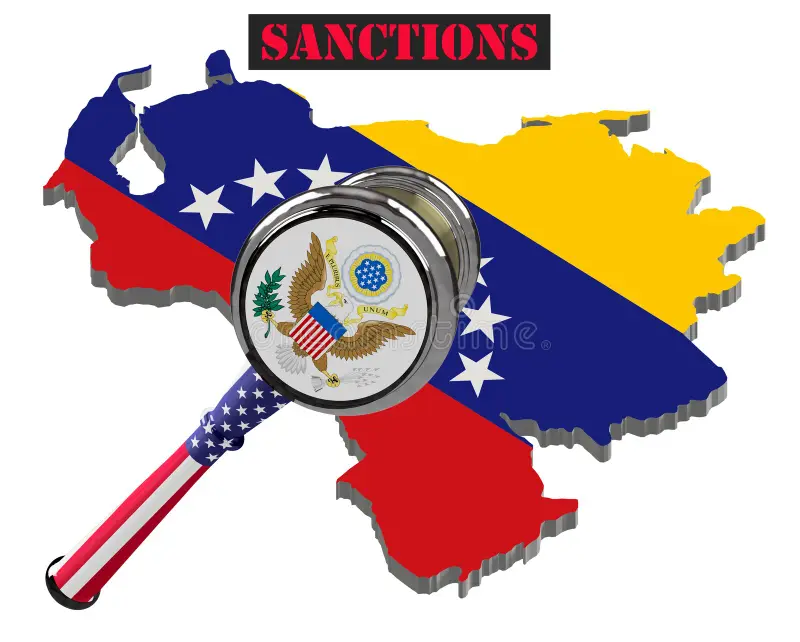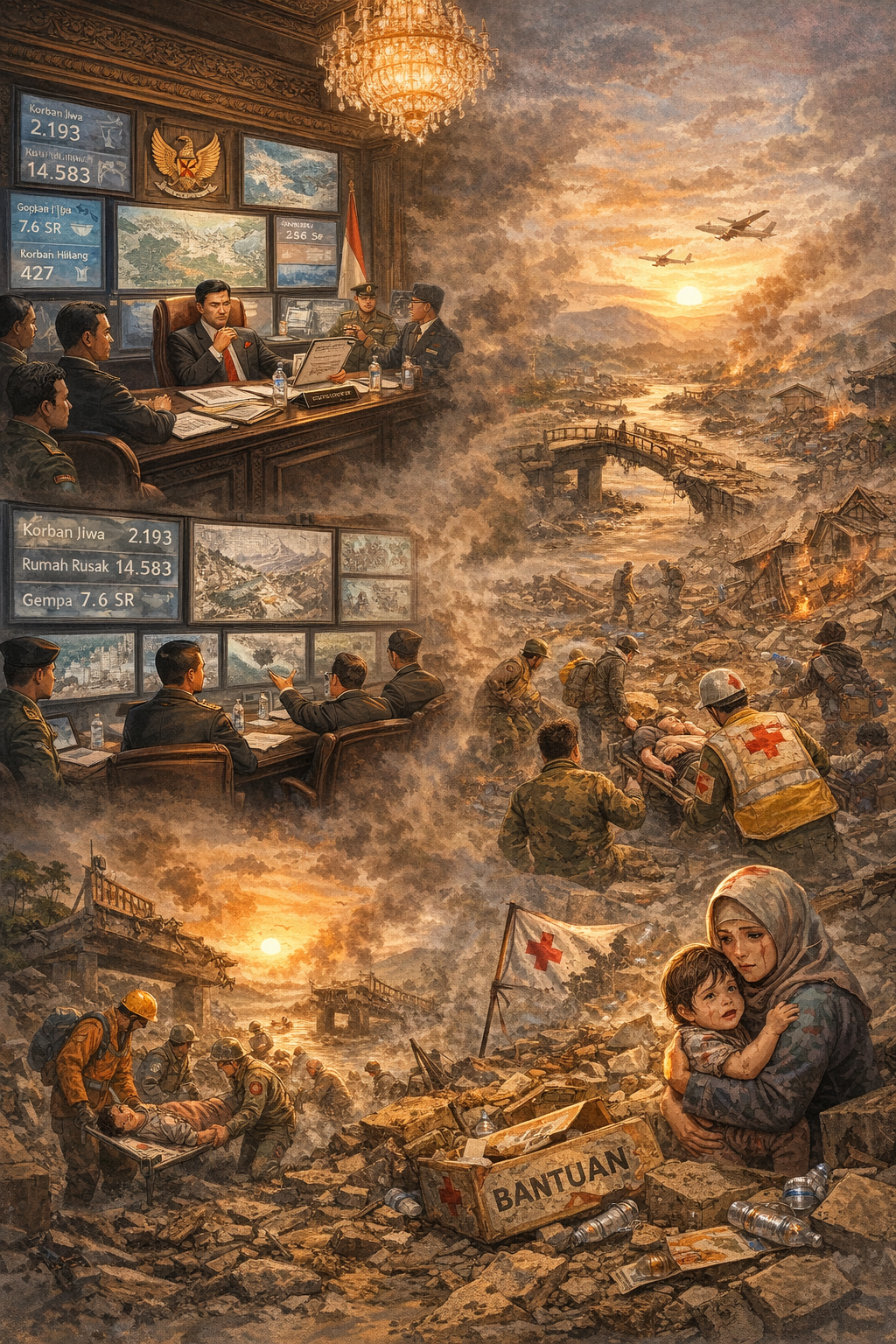Nuranilam, Muhammad Rizky Prawira, Riady Ibnu Khaldun
Universitas Sulawesi Barat
riadyibnu@unsulbar.ac.id
Venezuela, home to the world’s largest proven oil reserves, has depended on the oil industry as its primary source of national revenue for many years. Since the early 1900s, oil has been a cornerstone of the Venezuelan economy, accounting for over 90% of its exports and approximately 50% of its Gross Domestic Product (GDP). However, in 2014, the country started to face a deepening economic crisis triggered by a drop in global oil prices. This crisis set the stage for a series of more significant economic challenges, exacerbated by government policies under the leadership of Nicolás Maduro (Gualdron & Manzano, 2021). In 2014, global oil prices, once stable, began to drop significantly, which had a direct and severe impact on Venezuela’s economy, heavily dependent on oil exports. This decline in prices deepened Venezuela’s reliance on a single commodity, while the mismanagement of resources by Maduro’s administration made the situation even worse. The economic crisis worsened further when the United States imposed economic sanctions on Maduro’s government in 2015 in response to policies considered authoritarian and human rights abuses under his leadership (Kulesza, 2017).
The United States imposed a range of economic sanctions on Venezuela, including restrictions on access to international financial markets, freezing of government assets, and an oil export ban, which severely impacted the country’s primary income source (Qorina et al., 2020). These sanctions were initially intended to exert political pressure on Maduro’s government, which the United States deemed illegitimate. Over time, the sanctions became more severe, especially in 2017, when the United States introduced a full economic embargo on Venezuela. This embargo worsened the already fragile economic situation, causing a significant decline in oil production and exports, while also restricting access to essential goods such as medicines, food, medical supplies, and other basic necessities (Bull & Rosales, 2020).
The embargo sanctions imposed on Venezuela had far-reaching effects, extending beyond the energy sector to impact areas such as trade, investment, and the daily lives of the people. Restrictions on trade and exports, including a ban on selling oil to global markets, caused a severe drop in oil production. At its lowest point, Venezuela’s oil output fell to its weakest level in over 50 years, leading to a dramatic reduction in national income. Furthermore, the sanctions on the financial sector, which restricted Venezuela’s access to international funding, worsened the country’s budget deficit and made it harder to service foreign debt. Consequently, Venezuela found itself caught in a persistent economic crisis that was difficult to resolve (Caraballo-Arias et al., 2018).
The United States sanctions on Venezuela also had significant social consequences, especially for the daily lives of its citizens. Venezuelans experienced severe hyperinflation, making essential items like food, medicine, and household goods increasingly scarce, with prices soaring (Qorina et al., 2020). This created extreme hardship for many, particularly those who depend on low wages and government pensions. Moreover, the healthcare system in Venezuela collapsed due to a lack of access to necessary medications and medical equipment, resulting in many deaths that could have been avoided. The worsening living conditions in Venezuela prompted a large-scale migration, with millions of Venezuelans seeking refuge in neighboring countries such as Colombia, Brazil, and others. This crisis not only destabilized the country’s economy but also triggered a growing humanitarian emergency. The influx of migrants placed a heavy social strain on receiving countries, which had to manage an increasing number of refugees. This migration serves as a clear illustration of the lasting effects of economic sanctions on the Venezuelan population (Adawiyah et al., 2021).
This study aims to investigate and analyze the effects of the United States embargo sanctions on Venezuela’s economy, with a particular emphasis on the oil sector, which is the country’s primary source of income. In addition, the research will assess the impact of these sanctions on the social conditions of the Venezuelan people, including shortages of essential goods, healthcare challenges, and socioeconomic migration. The research also intends to address a gap in existing literature, specifically regarding the long-term consequences of economic sanctions on developing nations, especially those that depend on the energy sector for their economic stability. While previous studies have explored the economic effects of the sanctions on Venezuela, few have closely examined how these measures directly influence the socioeconomic conditions of the population or how they have contributed to a broader humanitarian crisis. Thus, this study is expected to offer valuable insights into the connection between foreign policy, global economics, and their impact on the well-being of people in developing countries affected by international sanctions.
The Impact of United States Embargo on Venezuela
To achieve its interests in Venezuela, the United States imposed economic sanctions on the country as a form of coercive diplomacy. The goal of these sanctions was to defeat and destroy its adversary. The imposition of these economic sanctions has worsened and destabilized Venezuela’s economy (Firdaus, 2019). The United States benefited from exerting pressure on Maduro’s existence as President of Venezuela, accusing the election process at that time of being fraudulent. As a result, the United States sought to force Maduro to step down from his position (Ismail, 2020). At that time, Maduro retaliated by reducing the United States access to Venezuela (Triandini & Paksi, 2023).
When Maduro was replaced by Juan Guaido as interim president, the United States saw an opportunity to align itself with Guaido by supporting him as the legitimate president of Venezuela. The United States hoped that its support for Guaido would foster new interactions and build a more cooperative relationship to further its national interests, especially in the oil sector. On the other hand, the United States sanctions against Venezuela further exacerbated the country’s economic decline. The losses experienced by Venezuela became one of the United States’ successes in achieving its objectives through coercive diplomacy, utilizing pressure or force. After the United States imposed sanctions on Venezuela’s oil companies, Juan Guaido, the leader of the Venezuelan opposition, claimed that his side had gained control over the country’s assets (Torres, 2024).
As a result of the sanctions imposed by the United States on Venezuela, the money generated from the sale of Venezuela’s oil will no longer be handed over to President Nicolás Maduro. The sanctions were intended to prevent Maduro and his government from benefiting from the proceeds of Venezuela’s oil companies. The sanctions imposed by the United States, which began during the Venezuelan administration, initially involved blocking assets in Venezuela. Now, the United States has implemented sanctions in the form of an embargo (Budisatria et al., 2022).
The sanctions imposed by the United States have had a severely negative impact, causing Venezuela to suffer significant losses due to its deteriorating and chaotic economy, largely because the country is highly dependent on the oil sector. The sanctions include asset freezes and restrictions on financial access through transactions involving individuals and entities related to the situation in Venezuela. Despite being the largest oil producer with many oil branches, Venezuela continues to face an economic crisis, even escalating into a humanitarian crisis and rising inflation. In this situation, the United States imposed economic sanctions on Venezuela, which threatened energy stability. The long-standing relationship between the two countries has started to deteriorate due to these sanctions. Therefore, if hostility arises between the two nations, the threat of a diplomatic break would hinder the United States’ access to Venezuela’s wealth from oil sales (Nuryanti, 2019).
The economic crisis that Venezuela was experiencing at the time led the United States to impose sanctions. These economic sanctions caused significant impacts on the Venezuelan people, as the country’s economy continued to worsen and become more chaotic. In such circumstances, many Venezuelans chose to migrate to neighboring countries. The United States economic sanctions on Venezuela caused concern within the United Nations (UN) regarding the situation in Venezuela, particularly the sanctions imposed on Venezuela’s oil companies, which affected Venezuelan citizens and led to further chaos, triggering other crises such as hunger and health crises (Lumintosari, 2021). When considering the conditions Venezuela has faced, it has caused numerous challenges for its citizens, who struggle to meet daily needs due to the sanctions imposed by the United States. If these sanctions are extended or if new sanctions are imposed by the United States, the situation in Venezuela will worsen, making it even harder for Venezuelans to access the necessities they need (Budisatria et al., 2022).
REFERENCES
Adawiyah, E. M., Suryana, C., & Tresnawati, B. (2021). Embargo dalam Pandangan Wartawan. Annaba: Jurnal Ilmu Jurnalistik, 2(4). https://doi.org/10.15575/annaba.v2i4.716
Budisatria, T., Hasibuan, B. H., & Dwiputra, R. H. (2022). Venezuela’s Hyperinflation: The Impact on Strategic Position of United States of America-Venezuela. Proyeksi: Jurnal Ilmu Sosial dan Humaniora, 27(1), 63-80. http://dx.doi.org/10.26418%2Fproyeksi.v27i1.2897
Bull, B., & Rosales, A. (2020). Into the Shadows: Sanctions, Rentierism, and Economic Informalization in Venezuela. European Review of Latin American and Caribbean Studies. https://doi.org/10.32992/erlacs.10556
Caraballo-Arias, Y., Madrid, J., & Barrios, M. C. (2018). Working in Venezuela: How the Crisis has Affected the Labor Conditions. Annals of Global Health. https://doi.org/10.29024/aogh.2325
Firdaus, F. (2019). Strategi Perlawanan Venezuela dalam Menghadapi Tekanan Amerika Serikat melalui ALBA Tahun 2015-2017. Jurnal Hubungan Internasional, 12(1), 41–58. https://doi.org/10.20473/jhi.v12i1.12973
Gualdron, L., & Manzano, O. (2021). Venezuela. In Oil Wealth and Federal Conflict in American Petrofederations. https://doi.org/10.1016/B978-0-12-822072-6.00007-5
Kulesza, M. (2017). Inflation and Hyperinflation in Venezuela (1970s-2016): A Post-Keynesian Interpretation. In Econstor.
Lumintosati, F. R., (2021). Intervensi Asing pada Krisis Venezuela: AS, Rusia, dan Uni Eropa. Jurnal Politikom Indonesiana, 6(2), 13–23. https://doi.org/10.35706/jpi.v6i2.5601
Nuryanti, S. 2019. Strategi Kebijakan Pemerintah Venezuela di Tengah Krisis. Sospol: Jurnal Sosial Politik, 5(2), 237-248.
Qorina, C., Mardialina, M., & Bustami, S. Y. (2020). Upaya Amerika Serikat Dalam Mencapai Kepentingan Ekonomi-Politik di Venezuela Pada Masa Pemerintahan Nicolas Maduro. Indonesian Journal of Global Discourse, 2(2), 74-91. https://doi.org/10.29303/ijgd.v2i2.24
Torres, A. (2024). An Inadequate Solution: Effectiveness of Economics Sanctions as an Instrument of Foreign Policy. Steven J. Green School of International and Public Affairs, Florida International University.
Triandini, M., & Paksi, A. K. (2023). Motivasi Amerika Serikat Memberikan Sanksi Ekonomi Terhadap Venezuela Tahun 2017-2020. Jurnal Ilmu Sosial dan Ilmu Politik, 12(3), 364-374. https://dx.doi.org/10.33366/jisip.v12i3.2672


